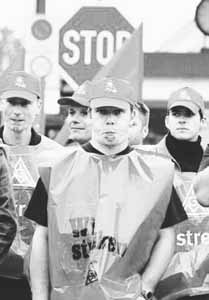

|
Metal workers are set back in Germany |

|
|
Metal industry workers picket an auto parts plant in Brandenburg June 25. Unionists returned to work June 30 after four weeks of rolling strikes shut down plants across eastern Germany. The strikes, organized by IG Metall, the giant metal workers union, were called to demand a reduction of the workweek from 38 hours to 35 hours for the union’s 310,000 members in eastern Germany. The demand was aimed at ending the disparity in the length of the working week in the industry between the east and west. The bosses organization counterposed a proposal to reduce the working week by one hour. On June 30 IG Metall officials called off the strike. “We’re admitting defeat,” said union chairman Klaus Zwickel. Germany currently has an official jobless rate of 9.4 percent. In the east unemployment is almost double the national figure at 18.6 percent. The German economy, officially in a recession, contracted 0.2 percent in the first quarter of this year. German chancellor Gerhard Schröder, the leader of the Social Democratic Party (SPD), said that the strike’s outcome proved the need for greater “flexibility” in labor relations—a buzzword for more local as opposed to national bargaining and other measures to weaken union power. Schröder’s SPD-Green coalition government is pressing for “reforms” aimed at reducing unemployment benefits and strengthening the employers’ ability to hire and fire.
|